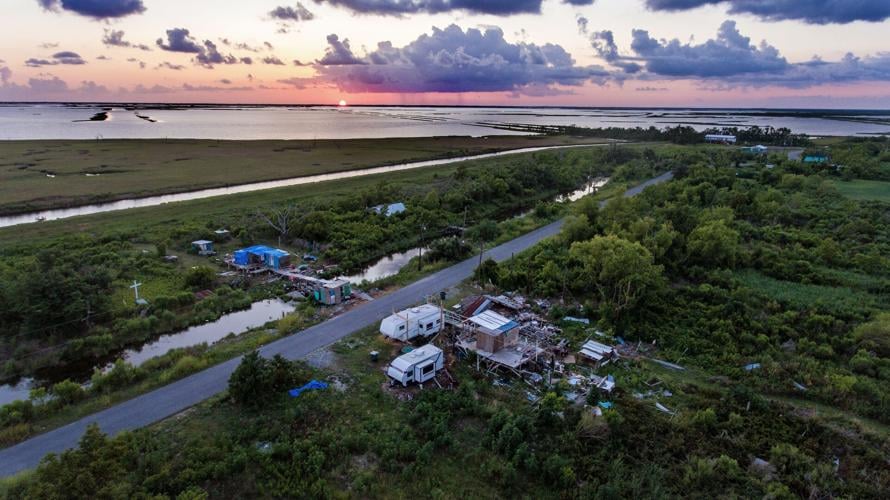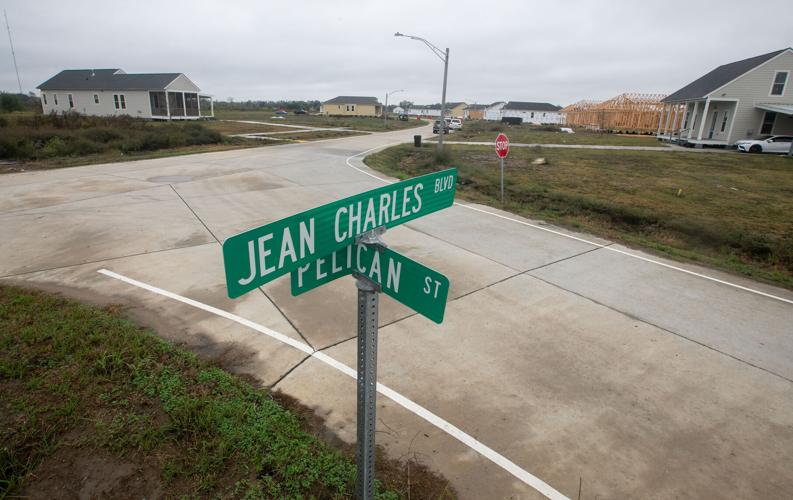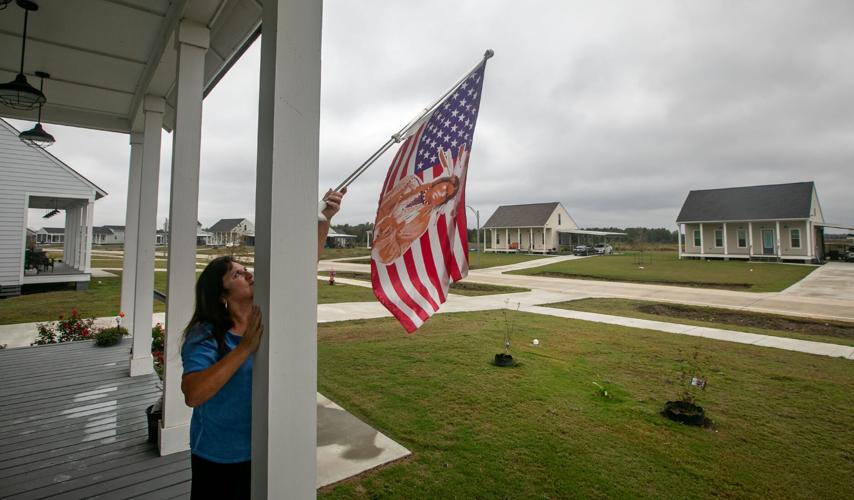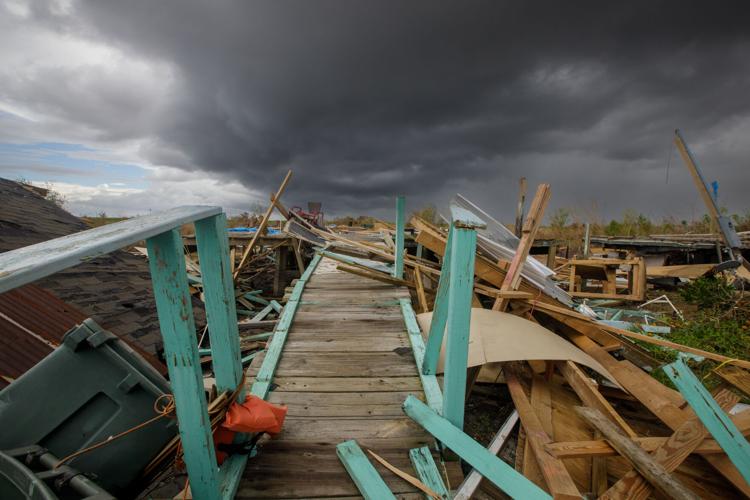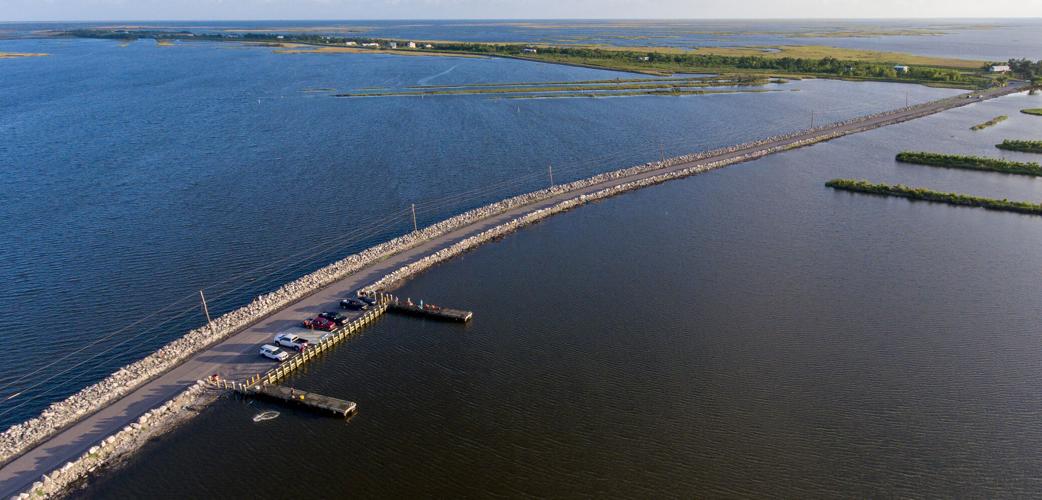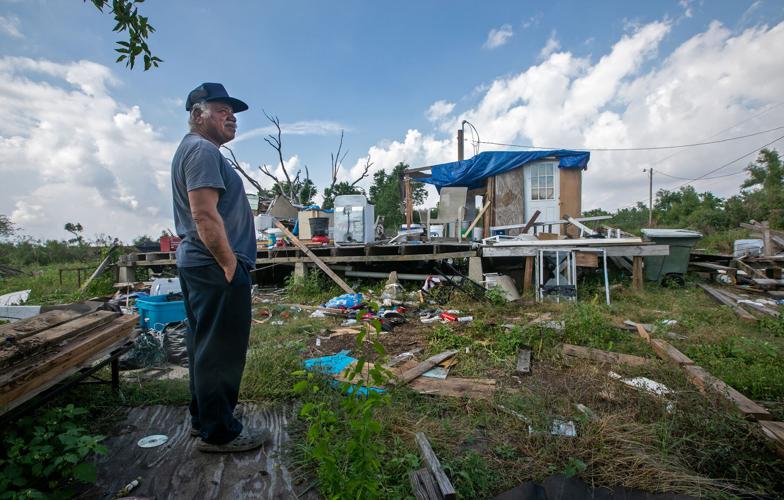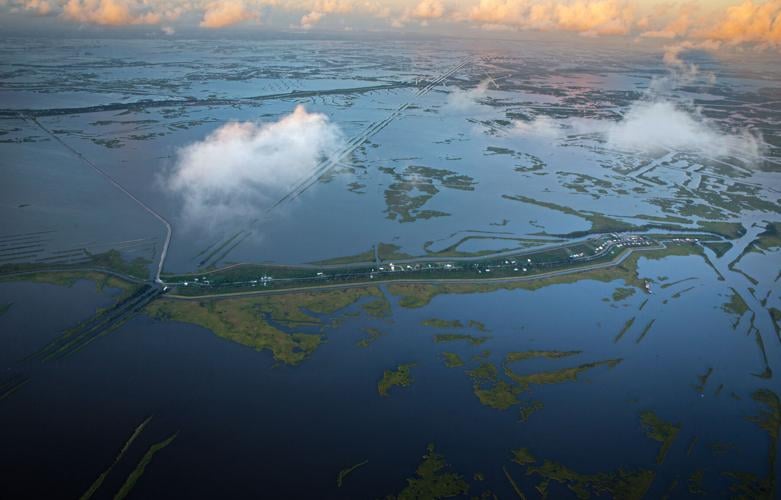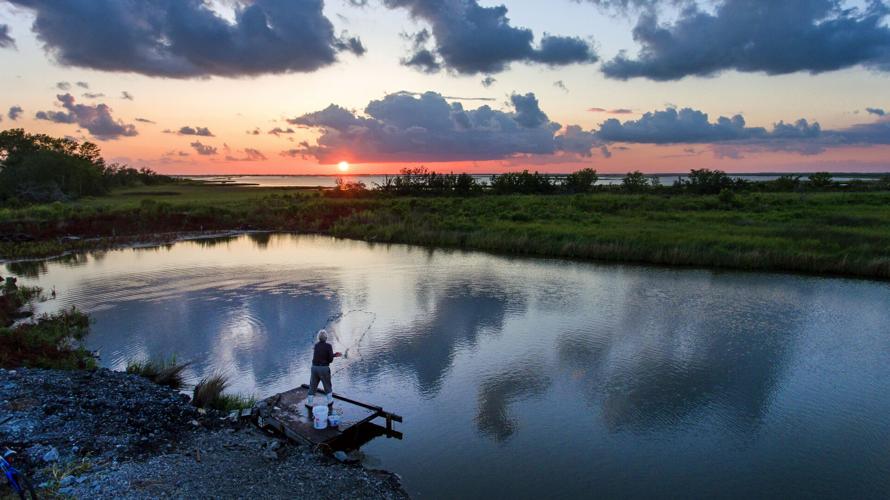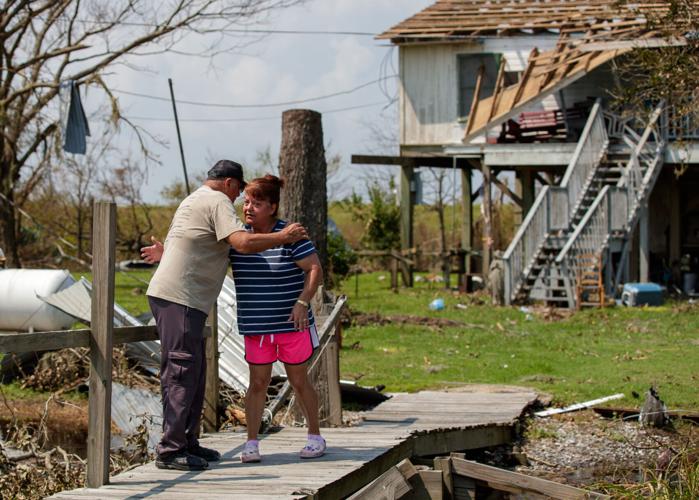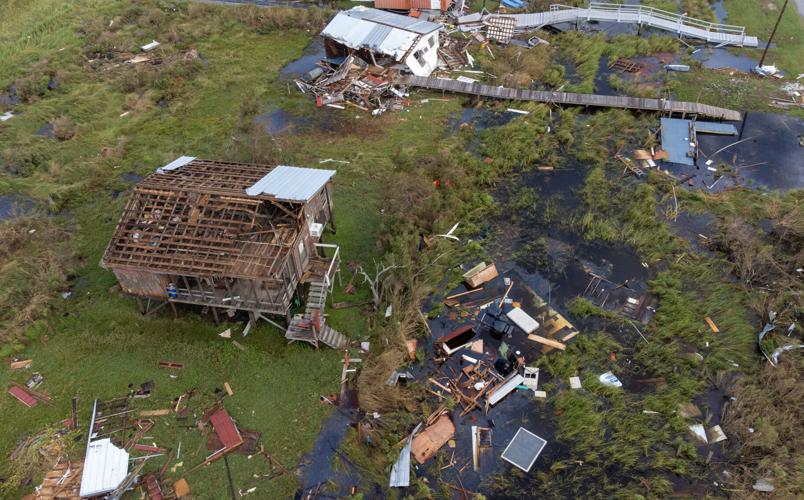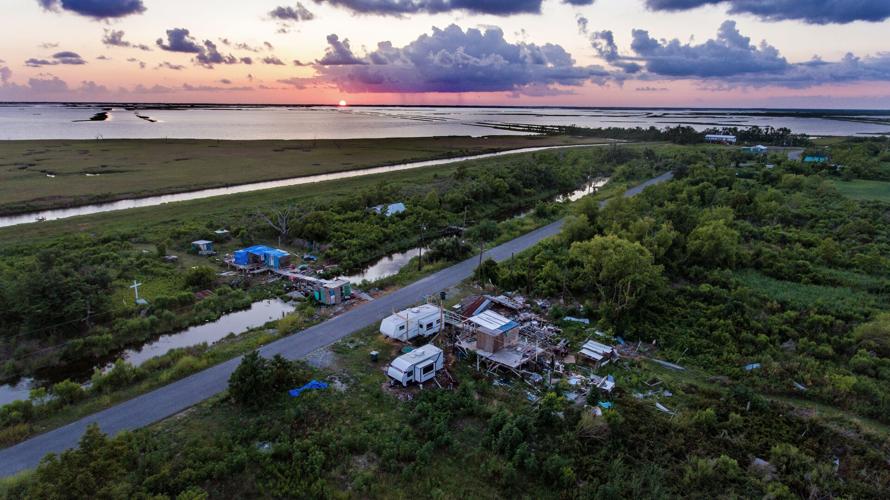The tribe representing current and former residents of a rapidly-sinking Louisiana island has filed a civil rights complaint against the state over its handling of the New Isle project, the country’s first federally funded resettlement of a community threatened by climate change.
The Jean Charles Choctaw Nation alleges the state Office of Community Development subjected the tribal members to “serious and ongoing racial and ethnic discrimination” by taking over the tribal-led Isle de Jean Charles resettlement project, pushing tribal leaders out of the decision-making process, and producing a “shoddy” subdivision that took several years to build and is now expanding with homes that will be available to non-tribal members.
The complaint, filed with the U.S. Department of Housing and Urban Development (HUD) on Thursday, asks that the 515-acre New Isle subdivision north of Houma be turned over to the tribe or that OCD provide a new resettlement site.

Governor John Bel Edwards greets Isle de Jean Charles resident Chris Brunet after he signed papers to close on his new house in Gray, Louisiana, Thursday, August 4, 2022. The signing is one of the first twelve households to receive a homeÑpart of a $48 million environmental crisis resettlement plan for the Jean Charles Choctaw Nation, formerly known as the Band of Biloxi-Chitimacha-Choctaw Indians. (Photo by Ted Jackson, Nola.com | The Times-Picayune | The New Orleans Advocate) ORG XMIT: NOLA2015061614435814
“They butchered that project,” Jean Charles Choctaw Nation Chief Deme Naquin said Friday. “We were mistreated as Native American Indians. We worked together to get the federal grant, but once the money was awarded, the state pushed us out.”
OCD declined to comment on the complaint. Agency officials have said in the past that the project’s focus shifted after some island residents told them they identified with other tribes or said the island’s tribe didn’t represent them.
“Naturally, from that point, (we) gravitated to working with residents, which really is more realistic than working with a tribe,” OCD Director Pat Forbes said last year.
New Isle’s first batch of 34 homes, given for free to people who had been displaced from the island after Hurricane Isaac in August 2012, were completed late last year.
On the front lines of hurricanes, sea level rise and coastal erosion, the tribe initiated resettlement planning in 2002. The plan gained traction when OCD agreed to apply for a HUD grant on the tribe’s behalf. The tribe is formally recognized by the state but not the federal government, and was ineligible to apply on its own.

Construction of the second phase of New Isle is underway in Schriever, La, by Louisiana Housing Corp. Tuesday, November 13, 2023. Residents of the Jean Charles Choctaw Nation were resettled from Isle de Jean Charles to higher ground in phase one of the massive project.
Awarded in 2016, the $48 million grant drew international attention and was celebrated as a potential template for other coastal resettlement efforts around the world. The grant covered the purchase of the property, located at a former sugar farm in Schriever, and the construction of homes, community buildings, roads and other infrastructure.
Once the money was in OCD’s hands, the tribe says it was cut out of the planning process.
“Among OCD’s changes, some of the most harmful have been downgrading the tribe’s status as a grant beneficiary to that of a mere stakeholder, creating stricter eligibility requirements for tribal members who were displaced before 2012, (and) requiring participants to sign away their rights to island properties…” the complaint says.
Home construction took years longer than planned, with several elderly tribal members dying before the project broke ground. New Isle remains uncompleted. A planned community center, playgrounds, retail structures and a marketplace have not been finished.

Ian Naquin, 29, sifts through the wreckage of his childhood home on Isle de Jean Charles on Saturday, September 4, 2021. "Found it!" he yelled, pulling out a treasured but sopping wet tiger he got at Disney World. Hurricane Ida destroyed almost all the remaining homes on the island in late August 2021. (Photo by Ted Jackson, Nola.com | The Times-Picayune | The New Orleans Advocate)
Residents have reported several problems with their new homes, including water damage from faulty plumbing, cracked walls, poorly installed lighting fixtures and rainwater pooling under floors.
The tribe is disappointed with OCD’s decision to open the project’s later phases to Louisiana residents with no ties to the tribe or island.
Construction of a second phase is underway. The 27 planned homes will cost owners between $150,000 and $175,000. Preference will be given to former island residents with low and moderate incomes, but this phase and possible later ones will likely be opened to any income-qualified Louisianan.
That runs counter to the tribe’s original vision of a “a tribe-led reunification” that would bring together many members that had left the island in recent decades due to storm damage and frequent flooding, the complaint says. For the tribe’s 700 members, the resettlement site would function much like an Indian reservation, with tribal-managed cultural, educational and health care facilities and business enterprises.

Lifetime resident Òuntil the day I dieÓ Edison Dardar casts his net for shimp less than 200 yards from his home at the north end of Isle de Jean Charles, Sunday, May 29, 2022. (Photo by Ted Jackson, Nola.com | The Times-Picayune) ORG XMIT: NOLA2015061614435814
The complaint alleges that the island, which now has only a handful of tribal residents, is being “repurposed as a ‘sportsman’s paradise.’” OCD put tight restrictions on residents who signed on to the resettlement. Agreements prevented residents from ever living on, renting or improving their island properties once they moved to New Isle.
Meanwhile, the state spent millions of dollars shoring up the oft-flooded main road and added recreational amenities, including a boat launch and fishing piers.
Private land owners have built new fishing cabins since Hurricane Ida damaged or destroyed the homes of several island residents in 2021.

Island Road links Isle de Jean Charles to the mainland. Government threats to halt repairs to the roadway helped convince many residents to leave their homes on the island. (Photo by Ted Jackson, Nola.com | The Times-Picayune | The New Orleans Advocate)
The state, the complaint says, continues “to play a central role in displacing tribal members from their traditional homelands…”
Naquin hopes the complaint serves as a warning to other communities that might take part in government-led resettlements.
“We’ve been wronged,” he said. “Our main goal is that this doesn’t happen to anyone else.”

